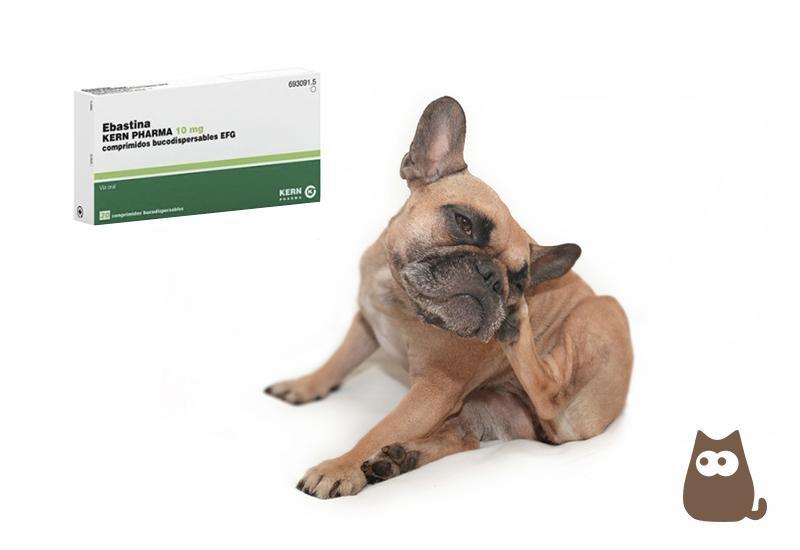Ebastine for Dogs - Uses, Dosage and Side Effects



See files for Dogs
Ebastine is a drug that is included within the group known as antihistamines. These drugs are very commonly used in human medicine and are widely used to treat allergy symptoms. They are common in many household medicine cabinets, but are incredibly varied in their action. This is dependent on their active ingredient, many of which can cause drowsiness. Ebastine is a type of antihistamine which is considered non-drowsy in people, but human medication does not always work the same for dogs.
At AnimalWised, we look at ebastine for dogs. We find out the uses of ebastine in canine veterinary treatment, as well as its dosage, side effects and other important information.
What is ebastine for dogs?
Ebastine is an antihistamine drug. Specifically, it is a second-generation antihistamine, meaning it has a more selective action and has less risk of adverse side effects. One of the most common side effects of antihistamines is drowsiness, although they can include a range of symptoms such as blurred vision and urinary problems.
Antihistamines are so called due to their action, since they are drugs that control the effect of histamine in the body. This substance is related to the typical signs of allergic reaction such as itching, swelling or nasal discharge in dogs. For this reason, it is very common for people with allergies to take antihistamines as soon as they experience the first symptoms of allergy. It is also used in the treatment of gastrointestinal ulcers, motion sickness, vertigo or migraines.
Antihistamines have been used and improved in human medicine for decades, but they are not considered as effective in veterinary medicine for dogs. They are not usually prescribed as a first option in these animals and only the veterinarian can assess their usefulness. For this reason, we should never give ebastine to a dog without specific instruction from a qualified veterinarian.
Ebastine is the active ingredient in various brands, including being marketed under the capitalized name of the drug, Ebastine. Other brand names of ebastine include Ebast, Ebatil and Atmos, among others.
Find out about one of the specific uses of ebastine for dogs with our article on canine food allergies.
Uses of ebastine for dogs
Antihistamines can also be used in cases of allergies in dogs, but their effectiveness is considered moderate. Results also depend on the individual dog's response. If the veterinarian decides to prescribe antihistamines, it is possible they may need to try more than one until an effective treatment is determined. These drugs can be administered to relieve mild itching in dogs suffering from canine atopic dermatitis, but when the pruritis is intense, they are considered ineffective. In these cases, the veterinarian will likely prescribe corticosteroid for dogs.
Studies have shown that the most successful antihistamines for atopic dogs are clemastine, a combination of chlorpheniramine and hydroxyzine and oxatomide. Ebastine is not among these antihistamines. For this reason it will not usually be the drug of choice, but they may be prescribed in some instances. It has also been shown that better results are achieved when selected antihistamines are combined with omega 3 and omega 6 fatty acids.

Ebastine dosage for dogs
The dose is determined by the size of the dog, the number of times the drug is administered per day and the clinical picture presented by the animal. This is the reason why the intervention of a veterinarian is essential, since only they can decide on these aspects. It is essential to bear in mind that an inadequate administration can cause serious health problems in the dog, so we should not self-medicate the animal or alter the dose indicated by the specialist. Ebastine can be found for sale in tablet form.

Contraindications and side effects of ebastine for dogs
Antihistamines should be administered with care in dogs with liver problems, certain gastrointestinal disorders, glaucoma, seizures or in pregnant dogs. This includes ebastine for dogs, although some studies have shown there are few risks to unborn animals.
Although ebastine for dogs is generally considered a safe medication, it is important we only administer the correct dosage and treatment duration indicated by the veterinarian. Side effects are rare and may only occur if the dog has a sensitivity to ebastine or any of a given drug's excipients. If an adverse reaction does occur, it may include:
- Drowsiness (although it is considered a non-drowsy antihistamine for dogs)
- Gastrointestinal issues
- Incoordination
When the dog has consumed an overdose of ebastine, the clinical symptoms concurrent with toxicity will occur. These are the symptoms of toxic shock in dogs and will be considered a veterinary emergency.
Find out more about allergic reaction treatment in dogs with our guide to safe allergy medications for canines.
This article is purely informative. AnimalWised does not have the authority to prescribe any veterinary treatment or create a diagnosis. We invite you to take your pet to the veterinarian if they are suffering from any condition or pain.
If you want to read similar articles to Ebastine for Dogs - Uses, Dosage and Side Effects, we recommend you visit our Medicine category.
- Bravo, V., Martorell, A. M., & González, J. L. (2011). Therapeutic options for canine atopic dermatitis . Veterinary Portal.







